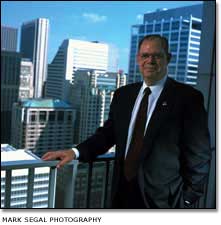|
||||||||
| My View |
| Becoming a more global enterprise Phil Condit Chairman and CEO  May
2002 hosted two key events that at first glance seem unrelated. Upon closer
review, a powerful connection can be found that has broad implications for
our team. May
2002 hosted two key events that at first glance seem unrelated. Upon closer
review, a powerful connection can be found that has broad implications for
our team.The first event was my Point to Point tour of more than 30 Boeing facilities in the United States. The second was the Boeing-sponsored tour of 15 European cities by the National Symphony Orchestra. The Point to Point tour celebrated the remarkable and diverse work of employee teams across Boeing. It gave me an opportunity to listen first-hand to employee viewpoints and ideas. And it allowed me to share my assessment of where we are as a company and how we are transforming ourselves for a better future. From the largest sites with the biggest products, to the smallest sites and the smallest products — and the exceptional capabilities in between — I met thousands of employees who are tremendously proud of their work and do a terrific job creating value for our customers and our company. The enthusiasm and enterprising spirit of Boeing employees remains strong. Yes, there's room for improvement in our work environment. There always is. But we have in our employees what it takes to succeed — no matter what the challenge. The NSO tour was about demonstrating to customers and other business partners that we are part of their world, that we are a truly global enterprise that participates actively in the communities where we do business. Each NSO event, which included a reception and concert, was hosted by an Executive Council member. Attendees included customers, supplier partners, media, and key local, national and European government leaders. There was a cultural aspect, a community aspect, and, of course, a business aspect. It all combined for a successful encounter that exceeded our expectations for building relationships and deepening our presence in critical European markets. So how do two events that took place an ocean apart and involved distinctly different Boeing stakeholders relate to each other? The answer lies in our strategy for globalization and what it means for employees. If we're going to continue creating value and opportunity, including jobs for Boeing people, we need to be global. In fact, if any big company is to be successful in the future, it has to be global. For decades, we have done a tremendous job selling our products and services to customers all over the world. But it is very different to be global than to sell globally. In this environment — with the complexities of international trade, economics, and politics — it is essential that we be part of the fabric of our critical markets, so that we are seen as part of them, rather than apart from them. The realities of a global market environment mean we cannot do business the way we have done in the past and expect to be successful. It is no longer enough to arrive with a great product and expect to make a sale. Companies and industries that understand this reality will prosper. Those that deny it will wither. What makes globalization so compelling, and so urgent, is that our competitors "get it." They are moving forward with aggressive globalization strategies. They are establishing relationships and partnerships designed to give them access to new markets and financial and intellectual capital from all over the world. Some of our competitors are U.S.-based and are looking for a broader global presence. Others of our competitors are European- or Asia-based and have established operations in the United States. They are in our back yard; we must be in theirs. Boeing has survived, indeed thrived, over the years because of our ability to adapt to challenges of shifting markets and changing customer preferences. One great challenge we face today is to rapidly and effectively globalize this company. It is also a great opportunity, one we cannot afford to pass up. |
| Contact Us | Site Map| Site Terms | Privacy | Copyright | ||||||
| © 2002 The Boeing Company. All rights reserved. |